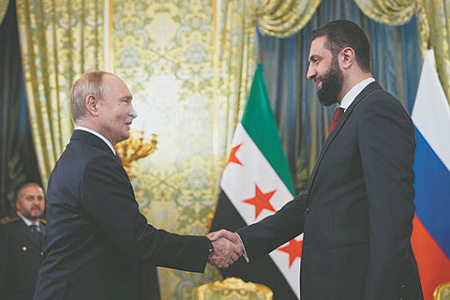
In a pivotal moment for international relations, Russian President Vladimir Putin and Ahmed al-Sharaa, Syria’s Transitional Leader, held their inaugural personal talks on October 15. This landmark meeting signals a profound shift following the ascension of an alliance of Islamist groups to power in Damascus on December 8, 2024. Al-Sharaa, a former field commander who previously led the Hayat Tahrir al-Sham militant organization (designated as terrorist and banned in Russia), articulated a desire to “reboot complex relations” between the two nations, a sentiment promptly echoed and supported by President Putin.
The discussions, held in Moscow, underscored the deep-seated diplomatic ties that have historically connected Russia and Syria. President Putin emphasized that these connections, established in 1944 during challenging times for the Soviet Union, have consistently been characterized by friendship, guided by the interests of the Syrian people rather than political expediency. He further lauded the Syrian parliamentary elections held on October 5, initiated by the new authorities, as a “great success.” Putin framed these elections as a crucial step towards societal consolidation, even as several semi-autonomous regions of Syria were notably excluded from the vote. His praise extended to thanking Damascus for hosting a Russian delegation led by Deputy Prime Minister Alexander Novak the previous month, noting that productive initiatives had been outlined.
For his part, al-Sharaa, who spearheaded the offensive on Damascus nearly a year ago, stressed the imperative of introducing the “new Syria” to the world and fostering stability within the country and the broader region. He articulated, “Today is a new day for a new Syria. We are introducing this new Syria to the world, and the world is getting acquainted with the new Syria.” He acknowledged Syria’s earnest pursuit of its political objectives and emphasized that Russia would play a “serious role” in this process, highlighting the enduring historical links and a history of Russian assistance across various domains. Al-Sharaa reiterated his earlier statements about the need to maintain existing energy, food, and arms connections with Russia, provided they respect Syria’s sovereignty and self-determination in decision-making.
Beyond the aspiration for bilateral development across economic and energy sectors, one of the most delicate issues on the agenda concerned the fate of former Syrian President Bashar al-Assad, who received asylum in Russia after losing power. Al-Sharaa has publicly stated his intention to pursue legal avenues to hold al-Assad accountable, as conveyed during a recent interview with CBS News. However, he carefully avoided making this an ultimatum to Russia, acknowledging the strategic disadvantage of such a move. Experts close to the situation suggest this stance is a necessary political maneuver for al-Sharaa to satisfy domestic constituencies, despite Russia’s likely reluctance to extradite al-Assad due to significant image considerations and strategic imperatives.
The operational status of Russian military bases in Syria also remains a critical point of discussion. Anton Mardasov, a Middle East expert, highlighted the complex nature of the current Russia-Syria negotiations, encompassing the functioning of facilities like the Khmeimim airbase and the extension of technical agreements. Mardasov pointed out that while Khmeimim continues to serve as a logistical hub for African operations, its military deterrence capabilities have diminished, with object air defense systems reportedly withdrawn in winter. This raises the possibility of relocating Russian air assets, potentially to Qamishli in northeastern Syria, where Russia maintains a presence and engages with the Kurdish-led Syrian Democratic Forces (SDF). While closer to the Turkish border, Qamishli could serve civilian purposes, and the continuation of operations at Latakia, along with the potential deployment of Russian patrols in the south for de-escalation with Israel, all remain possibilities.
Economic cooperation looms large, particularly the potential for Russian oil companies, drawing parallels to their operations in Libya, to enter the Syrian market. This prospect is amplified by the reluctance of Western businesses to re-engage in the war-torn nation. However, such ventures introduce significant security challenges, given the controversial perception of private Russian security contractors, such as those historically associated with groups like Wagner or Redut, both by Syrians and by Russian authorities themselves. Furthermore, the current leadership in Damascus faces the task of rebuilding its diplomatic presence. The former Syrian ambassador to Russia, Bashar Jaafari, an Assad appointee, was recalled in April—four months after the Baathist regime’s collapse. Diplomatic sources indicate he was summoned for an internal inquiry, perceived by the new authorities as an “Assad loyalist” facing potential accountability for his past allegiances.
This evolving relationship between Moscow and the new Damascus leadership navigates an intricate web of shared strategic interests, historical ties, and profound geopolitical shifts. Both nations are charting a course through a new, volatile political landscape, balancing the demands of internal legitimacy with the imperatives of regional stability and bilateral cooperation.
